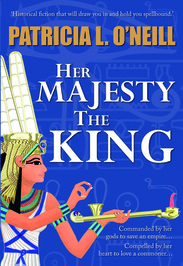Her Majesty the King
Princess Hatshepsut is ready to marry her half-brother Amenmose and produce a royal heir. But Amenmose will not marry her until his father, Pharaoh, dies. When Amenmose is killed in a Shasu raid, Hatshepsut dispatches one of the raiders with a knife. This is the final sign Hatshepsut’s mother, Queen Ahmose, will be overlooked. Hatshepsut will succeed her aunt Meritamen as God’s Wife.
The Shasu raid alters Hatshepsut’s destiny in another important way. Now that Amenmose is dead, she must marry her loathsome and incompetent brother, Tuthmosis, unless her mother can produce another heir before Pharaoh dies. In the meantime, Hatshepsut has fallen in love with the handsome commoner, Senenmut. He shows her how to stimulate the phallus of the god Amen-Re.
Queen Ahmose’s baby does not survive childbirth. Pharaoh asks Hatshepsut to marry him and produce the much- needed heir. She declines. Nevertheless, when Pharaoh dies, he passes the Horus, god of kingship and justice, to his gifted daughter Hatshepsut, rather than his wastrel son Tuthmosis. A female king will divide the realm. Hatshepsut makes the ultimate sacrifice, enduring her brother’s sexual depredations until she can rule in her own right.
The historical detail of this book is breathtaking. Costumes, religious rituals, cuisine and royal customs are intricately produced. Hatshepsut’s inner realisation of her kingship is also convincingly portrayed. But this is essentially a love story: a tale of Hatshepsut’s adolescent sexual relationships, her deep abiding love for Senenmut, and her degrading marriage to Tuthmosis. Major political events do not take centre stage. The characterisation is light, the plot at times implausible, the emotional climaxes not always fully realised. But if you enjoy wealth, a beautiful and intelligent heroine, dashing lovers, elaborate ceremony, sexual intrigue and dramatic death scenes, then this book is bound to satisfy.










